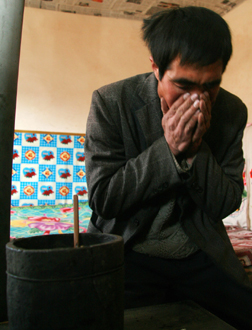Top Biz News
Work safety gaps suffocate miners
By Hu Yongqi (China Daily)
Updated: 2010-02-08 09:41
 |
Large Medium Small |
GULANG, Gansu: Ma Jiangshan wheezes like a broken accordion. His lungs are a diseased mess after 18 years down a gold mine and, despite accruing massive debt to pay for urgent surgery, doctors say his condition will kill him.
| ||||
In almost two decades, Ma paid no attention to the damage it was doing to his health. He worked long hours and rarely wore a facemask. He never thought for one second his job could cost him his life.
|
 |
|
Farmer-turned-miner Ma Jiangshan, 37, coughs in front of a pot of medicine being prepared for his lung ailment on Jan 27. [China Daily] |
"If we had been informed about the side effects, I would never have let him go down the mines, even if we did not have enough grain to feed us," said Liu Dongmei, 33, Ma's wife and mother of his four children. "We are at a loss over what to do now."
Ma was one of 304 people from Gulang diagnosed between 2002 and 2005 with pneumoconiosis, or black lung, which is usually caused by years of breathing in dust and smoke. Seven more died of the disease between 1999 and 2009, local villagers said. All of the victims worked in gold mines in nearby Subei county.
Black lung is China's No 1 occupational disease, with about 610,000 registered patients nationwide as of November last year, said Cai Rongta, a professor in labor health and occupational disease at Huazhong University of Science and Technology in Wuhan, capital of Hubei province.
Almost 80 percent of the 14,000 cases of occupational diseases reported to the Ministry of Health in 2008 were black lung, he said, adding that the disease costs the country an average of about 8 billion yuan ($1.1 billion) every year.
Experts warn that the high number of victims reflects serious flaws in the monitoring of occupational safety across China, and have accused local labor and health authorities of failing to protect workers.
However, most sufferers are concerned about what they will pay for treatment.
Scientists are yet to develop medication that can reverse or totally cure the effects of black lung. A patient's best chance of survival is to undergo surgery to "clean out" the lungs, health experts say. Paying for the procedure, however, is far beyond most farmers' reach.













